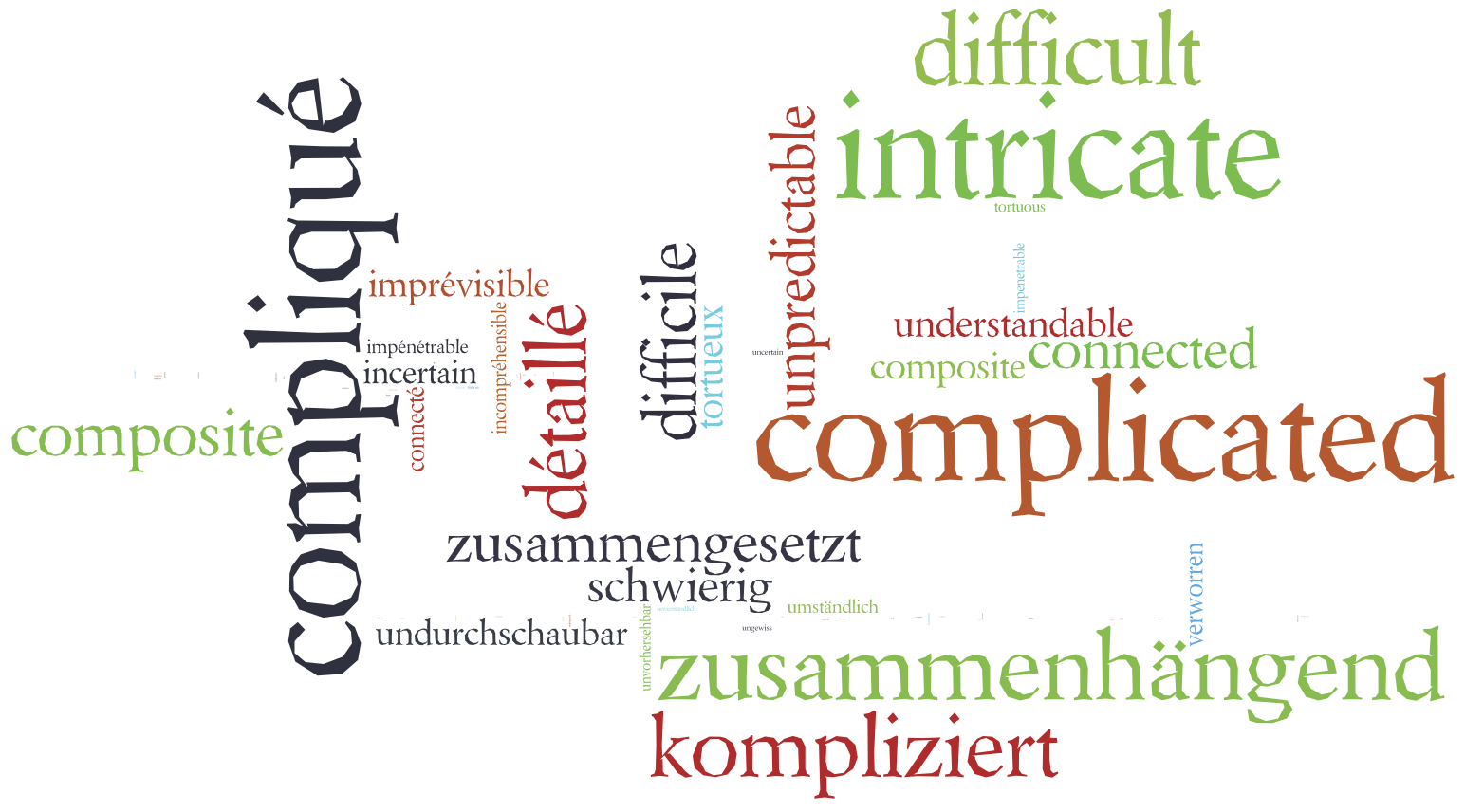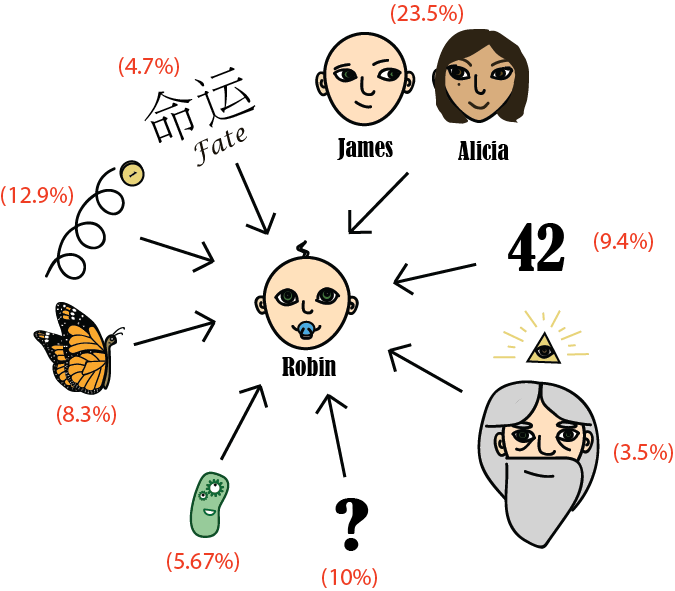Team:ETH Zurich/human/survey
From 2014.igem.org
Survey
Douglas Horton once said “The art of simplicity is the puzzle of complexity." We deal with complexity in our everyday life, we see it in nature. But how does this complexity emerge and how do we relate to it? Even before we can attempt to answer these questions we need to understand what people perceive as complexity and what they associate with it. Are the feelings associated with complexity positive or rather negative? Is a dog actually complex? And what about an atom? Or love? Where do people encounter complexity? How do they react to it; do they face it or do they choose to avoid it? In our survey, the questions range from general questions on complexity to questions directly related to our project.
However, before we tell you too much about our survey, we invite you to participate:
The survey can be filled in[http://docs.google.com/forms/d/1pvFPVzfH1aiNdy3MdAaaFFzeWysCZyDDybcqgt7LyzY/viewform?usp=send_form English], [http://docs.google.com/forms/d/1nLa1qMEAo9QjmIsOJgaN5pEVURDlVDqYKXuOvFnpjW4/viewform?usp=send_form German] and [http://docs.google.com/forms/d/1fQ0ZjKvnr-Ssek9fihlDRhmQsVaG8rwxCrNGHDC2JDU/viewform?usp=send_form French]
So far we have received 806 responses. The population consists of randomly selected people of all ages, sexes, and educational background. Further other iGEM teams were asked for their participation in our study, to have a more diverse population. Teams were requested to get more responses for our survey. Every team that managed to get at least 20 responses to our survey has been awarded a badge that can be posted on their wiki as a token of our appreciation. This task gave us a great opportunity to collaborate and network with different teams.
Our interpretations of the survey are summarised in the graphical illustrations below.
In the first part of our survey, we asked people to rate a list of 14 items on a scale of 1 (most simple) to 10 (most complex). The scale above is the median of the ratings for each item. From our survey, we found out that people almost unanimously agreed on human beings to be the most complex and a table to be the simplest. We also observed that people considered feelings, love, a cell, a dog and a city to be highly complex with a score of 9. It was also interesting to see that a computer and robot were considered to be equally complex with a score of 7. Hunger, calculator, battery and a house were considered to be relatively simple. In general we observed a trend of increasing complexity as we progressed from man made objects to living beings.
As mentioned above, we conducted the survey in three different languages - English, German and French. One of the questions in our survey was
How are your feelings about the word "Complex"? for which one could choose between three options- positive, neutral, and negative.
The combined results suggested that 54.32% felt neutral to the word, 32% associated it with positive feelings and about 13.7% had negative feelings for the word. However, as we looked at language specific responses we found that although the majority still felt neutral there was a difference in the numbers for positive and negative feelings. For instance, in Deutsch there was an equal number of positive and negative responses, while the French responses were slightly biased towards positive feelings (about 6%). In English however, 37% voted for positive feelings while only 12.77% voted as negative.
Further, when asked about where in everyday like people face complexity, majority of the people voted for at work and in relationships. The English and German responses further agreed on observing complexity in nature, but only 2% of the French responses voted for this. These questions were interesting as they throw light on the variation in the reactions to the word "complex" between people from different cultural backgrounds.
The word cloud above shows how people perceive complexity. We asked people to choose at most three synonyms for complexity from a predefined list of words.
In English the list included words like complicated, intricate, tortuous, impenetrable, difficult, unpredictable, not understandable, connected, composite, and uncertain. Of these words complicated, intricate and difficult were the most voted synonyms.
In German zusammenhängend and kompliziert stood out from the other options - kompliziert, umständlich, verworren, undurchschaubar, schwierig, unvorhersehbar, unverständlich, zusammenhängend, zusammengesetzt, and ungewiss.
In French, majority chose compliqué, détaillé, and difficile from compliqué, détaillé, tortueux, impénétrable, difficile, imprévisible, incompréhensible, connecté, composite, and incertain.
While the combined responses agreed on the word "complicated" (kompliziert and compliqué) as the closest synonym to complex, there were differences in the other words chosen. We mainly attribute this to the variation in the meaning and usage of the word which is specific to a language.
The following question from our survey elicited some of the most interesting responses:
A butterfly is happily flying. A driver gets distracted by it. An accident takes place. In the hospital, the paramedic who brings the injured car driver invites the medical doctor, James, to go diving. At the diving center, James sympathizes with the diving trainer, Alicia. On a Sunday afternoon, both James and Alicia are happy. Nine months later, Robin is born. Why is Robin born? Select at most 2 answers.
- Because of the butterfly flying
- Because James and Alicia were happy on a Sunday afternoon
- Because it was written
- We will never know
- Because ages ago, life appeared on the Earth
- Because of God
- Because of randomness, luck
- Because 42
The results for this question are summarised in the figure above. We were interested to see how people respond and reason out when given a series of events. The majority chose the union of James and Alicia as the main cause for Robins birth. We found that many opted for logical or funny responses while only 3.5% chose "god" as the cause. We think, this could be attributed to the age group population. Our survey was mainly filled by students and we think this could be add some bias to the results.
However, we mainly used this question to understand how people defined their frame size to relate the cause and outcome. For instance, those who chose "Because ages ago, life appeared on the Earth", had a wider frame relating the cause and outcome, while those who chose union of James and Alicia had a narrower frame. The answer chosen by the person taking the survey, in a very crude way shows the extent of complexity the person is willing to incorporate to relate the cause and result.
Apart from the options we provided, there were some amusing responses provided by the survey takers, some of which are listed below:
"because alicia is attractive!"
"Its complex :D"
"Because 42, Gosh, deep stuff, guys. Why and what for are we born ?"
"We will never know, It's a chain of consequences starting at the first ages of the planet, conjugated with randomness."
"There is not enough information."
Lastly, for us the most exciting part of the survey was the response to the questions addressing the need to understand complexity. When asked about approaching complexity, about 70% voted for simplifying and trying to understand complexity instead of avoiding it. Further, 57% voted in favour of our approach for understanding complexity. These responses were very encouraging and motivating for us.
Teams that hand in 20 or more surveys will get our badge. For more than 50 filled in surveys teams will receive the awesome golden badge.
 "
"






















